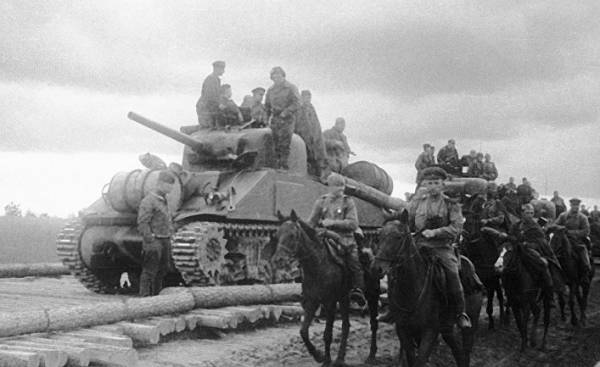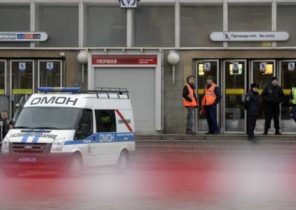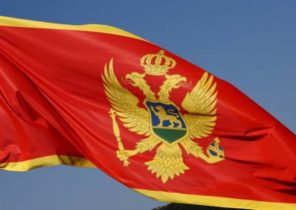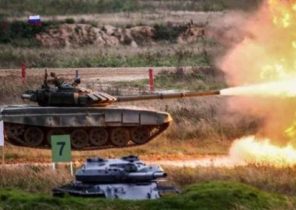The Czech Republic has become one of many battlegrounds where the Kremlin is trying to preserve its declining international influence. In our case the basic rate is clearly done on the interpretation of the results of the Second world war, and therefore need to be alert and to expose the Russian narrative. This applies to everything from the role during the war, played the Soviet Union, and until the facts about other countries ‘ contributions to the final victory over German Nazism and Italian fascism in Europe.
After the Second world war in Europe was 75 years, but the biggest conflict in human history is still relevant, and the reasons for that are several. First, the world community, aware of the damage that was inflicted by this war, committed by United Nations to maintain peace and security throughout the world. Formally, this organization is based on the principle of equality of all sovereign and recognized members of the international community, but in fact it is controlled by five countries that won in 1945.
At least equally important factor is that beginning, course and results of world war II remain an important political subject. Because today, with unprecedented speed in international relations returns a rivalry of powers, that is precisely the kind of behavior that provoked all major conflicts, this topic is extremely important.
History as a tool for the formation of modernity
In history there have always been those who accepted the existing distribution of power and its attendant system of international relations, and those whom they are not satisfied. The first tried to maintain this system, and others wanted to replace it useful. The loudest in the world about your dissatisfaction now says the Russian Federation. This country sees the results of the Second world war, the tool that gives her a legitimate right to participate with others in making decisions about how and in what direction the world (not)will develop. And Russia still manages to find allies.
In the Czech Republic its traditional allies — the Communists. A few days ago their Chairman Vojtech Filip gave a great interview with the Russian armed forces, “Krasnaya Zvezda”. In it he, in particular, fully supported the Russian interpretation of the past, because allegedly “the majority of citizens of the Czech Republic are grateful to the red army now 75 years old… Because in our history so we never helped” — as Philip has described another and modernity within the framework of the Russian official discourse.
In your own words that “some fascist politicians of Prague, under the negative influence of the EU and the US intend to violate the hitherto good relations between the two Slavic peoples and did not hesitate to insult liberators from Russia and other countries of the former Soviet Union,” Vojtech Filip, fully reflects the position that Moscow has long taken in respect of the Baltic countries and Ukraine.
Now the main issue in our relations with Russia, it seems, is the issue of monuments and evaluation of the past, but at stake is much greater. And I don’t even mean very difficult problems of Russian economic activities in the Czech Republic (primarily the completion of our nuclear power plants). Rather, I say that we have become one of many battlegrounds, where Moscow is trying to preserve its declining international influence.
This is not a topic for discussion…
In our case the basic rate is clearly done on the interpretation of the results of the Second world war, and therefore it is necessary to delve into topics that is not particularly resonate, but have “great potential” for the future. One of those was recently addressed in an interview that “Denikin” with Oleg Solodukhin, a Professor at the Moscow Higher school of Economics and Vice-President of PR Agency “CROS”, which carried out an information campaign explaining the government policy of the Russian Federation
In a long and Frank interview Solodukhin absolutely right spoke on many current topics of Czech-Russian relations. There is no doubt in his words about the war for most Russians is a “fundamental theme” to which they belong exclusively emotionally. “This is not a topic for discussion. For us, the war remains alive pain. And any attacks on our most sensitive point we believe it is sacrilege.”
Undoubtedly, the way it is, and no one dares to dictate or impose on the Russians their opinion on what and why they feel. The question involved the USSR in the beginning of the Second world war, editor Petra procházková got a sincere response: “I am a Soviet man who received a Soviet education. And there are things that I probably never will depart, and perhaps I won’t be able to go beyond some boundaries. So I insist that the USSR in the Second world war never started.” But why do we have no right to go beyond these boundaries?
The responses Solodukhina you can find the answer to this question. The liberation of Prague, in his opinion, began with the battle of Moscow in 1941, we suffered less from the war than the USSR. He also said, “I wonder how the Russian press has not yet returned to life the theme of Czech industry and its service to the Wehrmacht. Nowhere in your sources I have not found complete data on how much and what in the days of the protectorate you have made and sent to the Germans. I do not believe that the German and the Czech tendency to order and documenting this important stage was left without attention. And no accident on 25 April the Americans bombed the plant “Skoda””.
Interesting and reasonable arguments! It is impossible to deny that we have suffered from war much less than those regions of the Soviet Union, which were in a combat zone, or, say, neighboring Poland. Can’t argue with the fact that the Protectorate of Bohemia and Moravia was an important manufacturer of weapons for the Third Reich, and thereby strengthened his power. But as it is connected with the present? Is that a reason to unconditionally accept the Russian interpretation?
By the way, let’s turn to the topic of economic potential, which during the Second world war played a very important role, because in the end the victory was celebrated by the party that had far greater economic, human and military potential than the losers.
Dissatisfied, satisfied and observers
The second world war is a clash of powers, in which dissatisfied States: Japan, Germany and Italy attacked all happy powers (an example would be the agreement of the Choir — Laval of 1935 or the Munich conference of 1938), who tried to maintain the status quo, that is, France and the UK. Two other dissatisfied powers, the USA and the USSR, initially chose watchful waiting.
After the First world war, the United States participated in the creation of a new system of international relations, but soon turned away from her and chose neutrality. The USSR did not participate in the formation of a new system due to the Bolshevik revolution and the civil war. But in 1934 the USSR joined the League of Nations, which sat side by side with France and Britain. In August 1939, Stalin decided on an Alliance with Hitler. Yes, the Soviet Union signed a Treaty with Nazi Germany one of the last countries in Europe, but no other contract concluded with a member of the League of Nations, was not accompanied by secret protocols.
The contract was executed on September 17, 1939, when the Red army attacked from the East Poland, which since September first resisted the Nazis. Around the same time, specifically 21 September 1939, the Roosevelt administration in the United States pushed through a policy known as “cash and carry”. The warring countries could purchase in the United States any goods, weapons, and raw materials, if paid on the spot and assumed the risk associated with shipping across the ocean. So September 1939 was the first moment when the two powers, the future winner took decisions that need to be considered in assessing the results of the Second world war.
After the amazing victories of the Nazis in the spring and summer of 1940, when they conquered Denmark, Norway, Benelux and France, Britain was on the verge of defeat. Most of the British expeditionary force were evacuated from Dunkirk, but Britain still lost almost 70 thousand dead and captured, and in addition, almost all heavy weapons that remained on the continent. Also be aware that under the policy of “cash and carry” the British paid the Americans gold, which in the summer of 1940 they almost ended…
The Germans, who controlled all of the European coastline from the Spanish-French borders to the North Cape in Norway, have used all convenient ports and airfields for strikes both on the UK and on poorly guarded Maritime convoys, which were delivered to the Isle of raw materials, reinforcements and supplies.
Fortunately, in September 1940, the Roosevelt administration decided to ignore the anti-war sentiment in Congress and agreed to give 50 old destroyers to the British and canadian Navy. For this, the British pledged to put Americans on their sea and air bases in North America and the Caribbean, thus initiating the international presence of the American Navy and air force in the world.
Three factors of victory: time, money, blood
In December 1940, Churchill once again asked President Roosevelt for help, but then under the current political and legislative norms to provide her was impossible. Britain was left alone and could rely is that to support remote dominions: Canada, South Africa, Australia and New Zealand.
Probably, the temptation to sign a separate peace was a great and defeated both British and Germans. However, due to the stubbornness of Churchill that finally did not happen, and Britain continued, seemingly futile to resist. This is the first important factor in the victory as Britain, the third, the winner country in world war II and its “losers” a winner, its stubborn resistance gave Americans, but, more importantly, the Soviet Union an extremely important component of victory — time.
I remind you that in the meantime, in November 1939, the Soviet Union launched the so-called Winter war against neutral Finland, but before that, in September and October 1939, the USSR forced a neutral Estonia, Latvia and Lithuania to accept Soviet “protection” and agree to build their military bases. In March 1940, the Soviet Union signed a peace Treaty with Finland, which, however, lost part of its territory, but still defended its independence, while the whole Baltic States in the summer of that year it was annexed as well as the Romanian Bessarabia and Bukovina.
All this time, until the Nazi attack on 22 June 1941, the Soviet Union supplied Germany a huge amount of raw materials. It is worth noting that Germany already was one of the largest economies in the world, but it suffered from lack of raw materials. Soviet supplies set forth in the treaties from 1939, 1940 and 1941, the German pre-war meet the needs of more than 75% of food, primarily grain, manganese ore and oil. Compared to the previous period in the years of the Soviet-German trade increased ten times.
 © RIA Novosti, Alexander kapustyasky | go to fotomontajes tank unit on the American tanks “Sherman”, supplied under lend-лизу11 March 1941, Roosevelt managed to hold in Congress, perhaps the key act of the Second world war. The law on “lend-lease”. Thanks to him, the President received the legal right to provide governments, whose activities are important for the defense of the United States all possible assistance, including the sale and lease of military equipment. First, assistance was provided to the government of great Britain and its dominions, as well as “Free French” De Gaulle and China. After the attack on the Soviet Union, its automatically included in the program help.
© RIA Novosti, Alexander kapustyasky | go to fotomontajes tank unit on the American tanks “Sherman”, supplied under lend-лизу11 March 1941, Roosevelt managed to hold in Congress, perhaps the key act of the Second world war. The law on “lend-lease”. Thanks to him, the President received the legal right to provide governments, whose activities are important for the defense of the United States all possible assistance, including the sale and lease of military equipment. First, assistance was provided to the government of great Britain and its dominions, as well as “Free French” De Gaulle and China. After the attack on the Soviet Union, its automatically included in the program help.
This is the second important factor that we must consider: the largest and richest country in the world whose economic and human resources have not yet participated in the conflict, she chose the side that wants to help. Even before the attack on themselves Americans abandoned the neutrality which they were bound, and gave eventual winners essential economic assistance or if you want money.
On 22 June 1941 the USSR was attacked, and thus began the largest land war in history. In 1941 — 1943 in Europe was the one up front, and until the end of the war he demanded the maximum German forces — almost 50%. The battles were fought an incredibly bloody, and the Nazis did not hide that their purpose — to destroy. Huge losses suffered by the peoples of the former USSR in the battles with Nazi Germany and its allies, of course, was the third decisive factor in the final victory, which we can symbolically denote as “blood.”
However, we must not forget that the Second world war was a modern war, in which human courage, resilience, courage and self-sacrifice were often powerless in the fight against an enemy that was better armed and equipped, which was more mobile and had plenty of ammunition. Don’t be of time, money and blood, Hitler either would have failed to win, or would have to incur even more losses over a longer period.
Only because the allies managed to co-ordinate their actions, set priorities, and some things close to the eye (e.g., Katyn), they managed to win. But it was a common victory, and the blood that was shed mostly by the Soviet side (and it was never only Russian blood), two other components could be spilled in vain.
Help at the last moment
When in November 1941, the Nazis approached Moscow, to the place where, according to Solodukhina, the liberation of Prague, they captured a large part of European Soviet territory, killed and captured an unimaginable number of soldiers and destroyed a great number of weapons. According to the historian Alexander hill, the victory at Moscow and on one hundred percent recaptured by soldiers of the red army, helped the UK. After the first convoy of Soviet aid went to sea in September 1941, and because of this, in the battle of Moscow were British-made tanks.
According to some estimates, early in the war, the USSR had more tanks than all other powers put together, but in the first five months, the Germans managed to destroy 20 thousand Soviet tanks. Almost 500 tanks, which the British supplied the USSR until the end of 1941, represent only a small percentage of total Soviet production during the war, but at the moment when the evacuated Soviet factories have not yet started production, these 500 tanks was 30 — 40% of all tanks that the Red army could apply near Moscow. Also the British put about 15% of the aircraft.
Thus, it is not the quantity, but just in time! Hill, incidentally, sums up his article with the words: “British delivery, of course, did not save the Soviet Union from defeat at Moscow, but the speed with which Britain was ready and able to assist, along with the speed with which the USSR was able to use it on the front, are undervalued component of success. During fierce battles in the winter of 1941 — 1942 British aid played a fundamental role.”
In the following months and years, Soviet industry was producing more tanks, guns, mortars, grenade launchers, rifles and pistols, but in the war, as strange as it may sound, only weapons can not win. Under allied, mainly American, of supplies, the Soviet Union received vital assistance in the so-called sensitive sectors of military production. Talking about production, whose production was from a technical and technological point of view is extremely difficult and demanded many skilled workers. And the USSR and the modern Russia in these sectors has lagged behind.
What was delivered? For example, the United States delivered more than 400 thousand trucks and jeeps (for example, 20 thousand systems “Katyusha” was installed on American cars), 14 thousand, 13 thousand tanks, eight thousand tractors and construction equipment. The programme in the Soviet Union sent nearly two thousand locomotives (in 1942 — 1945, the Soviet Union produced just 92 locomotive), thousands of railway cars and almost half of the rail that was laid on the new routes, and hundreds of thousands of tires.
The US and Britain have provided 57% of the total volume of aviation fuel supplied about 30% of ammunition, 32 thousand transmitters, radars, and radars, as well as millions of pairs of shoes and a huge amount of food. Of course, the Soviet soldier was less demanding than British or American, but even he wouldn’t be able to fight effectively without shoes, food, medicine, and enough ammo…
I could cite other figures, showing how small or large a percentage of the total Soviet production was represented by the rescue, but the purpose of this article is not that. It is important that the defeat of Nazi Germany and its allies was the common case in which the USSR undoubtedly played a crucial role, but he was never the only conqueror of victory.
Moscow has no right to demand from anyone eternal gratitude. And not only because of the role that the USSR played in the beginning of the conflict, but also because, with the exception of Austria and the Danish island of Bornholm, in all countries where the Red army drove the Nazis seized power, local Communists. Subsequently they with their repressive and violent policies for decades have condemned millions of people to freedom.
By the way, the regime, which feared the freedom of their own people, nobody else genuine freedom could not be. The fallen red army soldiers still deserve our respect and to peacefully rest in our land. But we must resist the modern Russian political establishment, to today, he couldn’t use their sacrifice as well as his time succeeded Stalin.
The author is a political geographer, fellow of the Faculty of social Sciences of Charles University and Metropolitan University in Prague.







